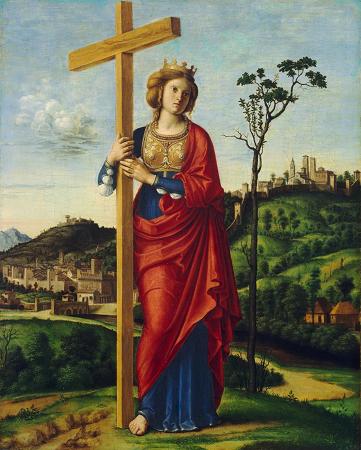Saint Christopher. Saint Christopher is venerated by several Christian denominations as a martyr killed in the reign of the 3rd-century Roman Emperor Decius or alternatively under the Roman Emperor Maximinus II Dacian. There appears to be confusion due to the similarity in names Decius and Dacian. However his veneration only appears late in Christian tradition, and did not become widespread in the Western Church until the Late Middle Ages, although churches and monasteries were named after him by the 7th century. His most famous legend tells that he carried a child, who was unknown to him, across a river before the child revealed himself as Christ. Therefore, he is the patron saint of travelers, and small images of him are often worn around the neck, on a bracelet, carried in a pocket, or placed in vehicles by Christians. Legends about the life and death of Saint Christopher first appeared in Greece in the 6th century and had spread to France by the 9th century. The 11th-century bishop and poet Walter of Speyer gave one version, but the most popular variations originated from the 13th-century Golden Legend. According to the legendary account of his life Christopher was initially called Reprobus. He was a Canaanite, 5 cubits tall and with a fearsome face. While serving the king of Canaan, he took it into his head to go and serve the greatest king there was. He went to the king who was reputed to be the greatest, but one day he saw the king cross himself at the mention of the devil. On thus learning that the king feared the devil, he departed to look for the devil. He came across a band of marauders, one of whom declared himself to be the devil, so Christopher decided to serve him. But when he saw his new master avoid a wayside cross and found out that the devil feared Christ, he left him and enquired from people where to find Christ. He met a hermit who instructed him in the Christian faith. Christopher asked him how he could serve Christ. When the hermit suggested fasting and prayer, Christopher replied that he was unable to perform that service. The hermit then suggested that because of his size and strength Christopher could serve Christ by assisting people to cross a dangerous river, where they were perishing in the attempt. The hermit promised that this service would be pleasing to Christ. After Christopher had performed this service for some time, a little child asked him to take him across the river. During the crossing, the river became swollen and the child seemed as heavy as lead, so much that Christopher could scarcely carry him and found himself in great difficulty. When he finally reached the other side, he said to the child: You have put me in the greatest danger. I do not think the whole world could have been as heavy on my shoulders as you were. The child replied: You had on your shoulders not only the whole world but Him who made it. I am Christ your king, whom you are serving by this work. The child then vanished.Christopher later visited Lycia and there comforted the Christians who were being martyred. Brought before the local king, he refused to sacrifice to the pagan gods. The king tried to win him by riches and by sending two beautiful women to tempt him. Christopher converted the women to Christianity, as he had already converted thousands in the city. The king ordered him to be killed. Various attempts failed, but finally Christopher was beheaded. The Eastern Orthodox Church venerates Christopher of Lycea with a Feast Day on May 9. The liturgical reading and hymns refer to his imprisonment by Decius who tempts Christopher with harlots before ordering his beheading. The Kontakion in the Fourth Tone reads: Thou who wast terrifying both in strength and in countenance, for thy Creator's sake thou didst surrender thyself willingly to them that sought thee; for thou didst persuade both them and the women that sought to arouse in thee the fire of lust, and they followed thee in the path of martyrdom. And in torments thou didst prove to be courageous. Wherefore, we have gained thee as our great protector, O great Christopher. The Roman Martyrology remembers him on 25 July. The Tridentine Calendar commemorated him on the same day only in private Masses. By 1954 his commemoration had been extended to all Masses, but it was dropped in 1970 as part of the general reorganization of the calendar of the Roman rite as mandated by the motu proprio, Mysterii Paschalis. His commemoration was described to be not of Roman tradition, in view of the relatively late date and limited manner in which it was accepted into the Roman calendar, but his feast continues to be observed locally.
more...













